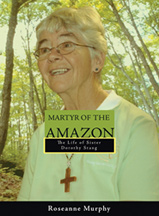On February 12, 2005, a 74-year-old American-born missionary, Sister Dorothy Stang, was assassinated in the Brazilian Amazon. She had been helping the area's poor landless peasants fight illegal exploitation by logging firms and ranchers. For 30 years, Sister Dorothy did everything she could to protect the rainforest and its people. She wore a t-shirt with the words: "The death of the forest is the end of our lives." Her assassination came 16 years after the murder of Chico Mendes, an environmentalist whose death brought international attention to the dangers faced by activists in the Amazon.
Roseanne Murphy is the Executive Director of Planned Giving for Notre Dame de Namur University at Belmont, California. In this timely biography of Sister Dorothy Stang, she covers her life and ministry with loving care. Sister Dorothy was born in Dayton, Ohio, and attended Julienne High School. There she decided to become a nun and joined the convent of the Sisters of Notre Dame de Namur in Cincinnati. After teaching for a while, she answered the call that went out from Pope John XXIII asking North American religious communities to send personnel to serve in Latin America.
Among the poor, she was seen as an angel, but the powerful ranchers, loggers, and other advocates of Brazilian progress saw her as a troublemaker and put out a reward for anyone willing to kill her. Sister Dorothy shared with a friend:
"I have learned that faith sustains you and I have also learned that three things are difficult: as a woman, to be taken seriously in the struggle for land reform; to stay faithful to believing that these small groups of poor farmers will prevail in organizing and carrying their own agenda forward; and to have the courage to give your life in the struggle for change."
As Murphy points out at the end of the book: Sister Dorothy made a big difference in the lives of the poor people she served: she started a Farmers' Union, established over 23 schools, taught sustainable farming techniques in her efforts to save the rainforest, and raised the consciousness of those who had yet to realize their rights.
